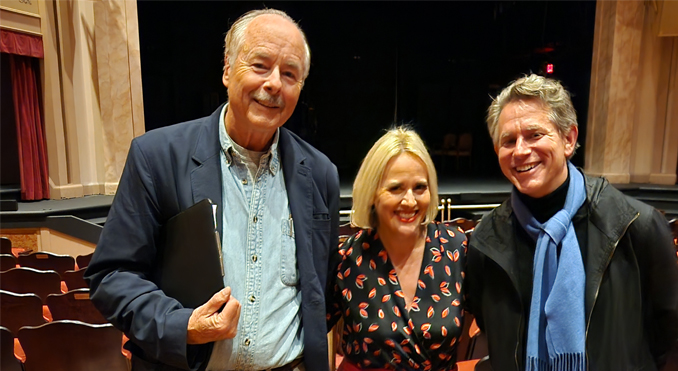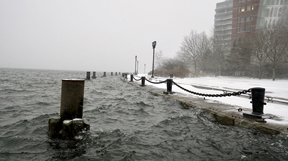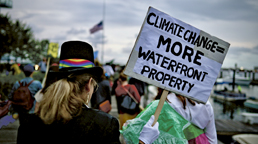
by Debbie Tuma

Anyone living along a U.S. Coastal area would be wise to check out a new documentary film by David Abel of the Boston Globe, an environmental reporter who has produced stories and films about the ocean, and climate change. After having shown his film, “In the Whale,” at Westhampton Beach Performing Arts Center last spring, Abel returned in November to show his latest documentary, “The Inundation District.” For his film he changed the name of a $20 billion development called “The Innovation District,” on Boston Harbor, to raise awareness of the problems within. This project consists of 7 million square feet of multiple use–including luxury high-rise apartments, major tech companies and other corporations, restaurants and retail space, which has been built along the Boston waterfront.
But with growing flooding issues, and sea levels rising at a dramatic rate over time, this project is now being re-examined. In this film, Abel shows interviews with many residents who live in this area, along with people who work there, and also the developers themselves, and even Boston Mayor Michelle Wu.
“As a print journalist I felt it was hard to tell the story—it needed to be told visually,” said Abel, explaining why he decided to make the film. He also showed how this project would affect “the most vulnerable,” the homeless population. He cited that in 2023 alone, there were 28, billion dollar storms in Boston.
“But the latest two storms, Hurricane Helene and Hurricane Milton, exceeded all the damage from storms in 2023,” he said. Another fact cited in the movie is that, because of its vulnerable location, Boston will experience 25 percent more impact than the rest of the world, and the area’s population has tripled over the past three years.

The Innovation District is home to General Electric, Fidelity Bank, and other big corporations that are still trying to come in. Yanni Tsipsis, Senior Vice President of Seaport WS Development, who oversees the Innovation District development, explained that there are 20 city blocks on 33 acres.
“We plan to own this project for a long time,” Tsipsis said. But Abel argued, in his film, that this may not be possible with the fast rate of climate change, from the icebergs melting in Antarctica, to the corals dying in the oceans, to the depletion of various animal and fish species.
In the film, John Sullivan, Chief Engineer of the Boston Sewer District, said that the major floods, like the 2018 King Tide, “are becoming a regular appearance.” “The systems aren’t designed to take increasing water storm surge,” he said.
And Steve Hollinger, a Boston Seaport resident, commented, in the film, on the “short term thinking” of the city of Boston for not planning for climate change.” “It was a quick buck for the corporations, but who’s gonna pay for it?” he said. “We’re left holding the bag.”
Afterward, there was a question and answer session with director and writer David Abel. “I grew up on Long Island, and I wanted to make this film about a situation that could potentially happen here, with rising tides,” he said. “We need to prepare for the future, before it’s too late.”
Heather Draskin, Marketing Director for the Westhampton Beach Performing Arts Center (WHBPAC), said she was happy to bring back David Abel, who previously showed his documentary film “In The Whale” there. “He sheds light on the troubling climate situation that Boston is currently experiencing, but the uncertain themes of the film ring true for all coastal communities,” she said.
Westhampton Performing Arts Center will have the Peconic Theatre doing “The Nutcracker” on December 14 and 15, and all are invited to come. And also come for a fun New Year’s Eve, when comic Anthony Rodia takes the stage on December 31 at 7 pm.
“We’re thrilled to host an exciting evening of comedy that will ring in the New Year with tons of laughter and fun,” said Draskin. “Anthony Rodia and his signature brand of “off the boat” comedy resonates with Long Islanders and we know this will be a great way to celebrate the New Year.”

